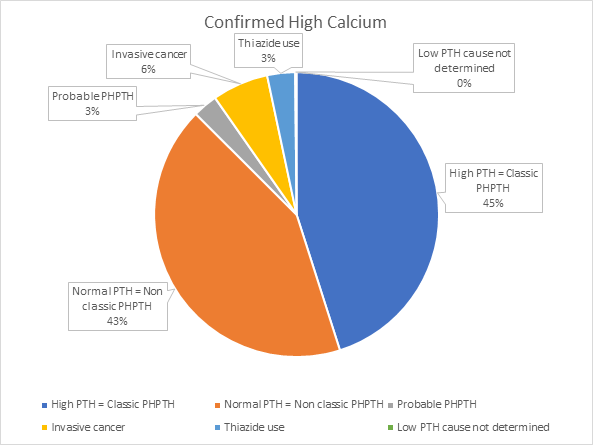Kidney Stones and Parathyroid
Kidney Stones and Parathyroid Consequences
It is well known that patients with hyperparathyroidism, and the high calcium associated with it are at increased risk for developing kidney stones. And so, kidney stones can be the first evidence of a high serum calcium level. However, it is estimated that only a small percentage of patients who develop kidney stones do so because of a high calcium level. For that reason, just having a kidney stone is not likely to lead to a diagnosis of hyperparathyroidism. On the other hand, IF someone has a kidney stone, and also has a high serum calcium level, or even a high normal serum calcium level, one should at least suspect and test for hyperparathyroidism. This is a very simple thing to do by checking a serum calcium level combined with an intact PTH level.
Patients with hyperparathyroidism have excess PTH secretion, which increases the serum calcium level, and secondarily increases the amount of calcium excreted in the urine. This higher concentration of urinary calcium leads to the increased risk for developing kidney stones, and the stones are typically comprised of calcium, which should come as no surprise. Not all kidney stones are composed of calcium, and it is common to analyze a kidney stone for its composition, if the stone can be retrieved when it passes.
If you have had kidney stones, and your serum calcium level is normal, then it is very unlikely you have hyperparathyroidism. However, if your serum calcium is in the high 9 range, it would be prudent to check an intact PTH level to be sure that it is in the low normal range. If your serum calcium is in the normal range but near 10, then your PTH level should be near the low end of the normal range. If both the calcium and intact PTH levels are in the high normal range, it is likely that you do have a mild form of hyperparathyroidism causing your stones. If the calcium and PTH levels are in this gray zone, it can be a bit more challenging to establish the diagnosis of hyperparathyroidism, and it might take some repeat testing to be certain that an operation is appropriate. But the bottom line is, someone with kidney stones and a clear diagnosis of primary hyperparathyroidism should be referred for curative parathyroid surgery.
Schedule a consultation with Dr. John S. Kennedy to learn more about your condition and possible treatments.
“When we catch hyperparathyroidism early, we can cure it before it damages your body. If you have a high calcium level, take it seriously and get tested.” — Dr. John S. Kennedy
Incidence and prevalence of primary hyperparathyroidism in a racially mixed population.

J Clin Endocrinol Metab. 2013 Mar;98(3):1122-9. Yeh MW, et al.


